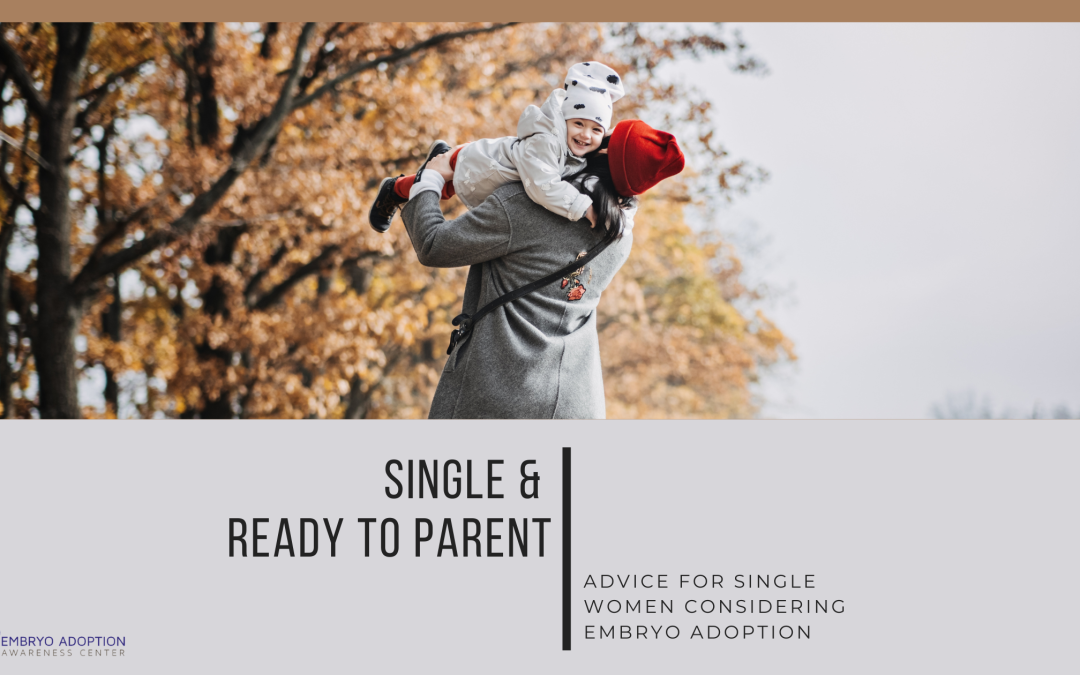Many women dream of starting a family, perhaps marriage, children, and even a dog or two. However, life does not always follow the path we imagine. For women approaching their late 30s or early 40s who are still single, the desire for motherhood does not diminish and remains just as real.
If you are on the path to pursuing motherhood as a single woman and find yourself wondering, “Am I ready? Can I really do this? What if Mr. Right comes along later?” know that these questions are completely normal. Embryo adoption is a beautiful way to pursue motherhood, though it is not a path without its challenges.
The key is to embrace the unknown, take time to reflect on what you truly want, make a thorough plan, and build a strong support system. Here are some tips to guide you as you take your first steps toward parenthood.
1. Reflect on Your Readiness
Before beginning the process, it is important to pause and ask yourself some key questions that will help clarify your readiness. Start with the important aspect: “Why do I want to become a parent right now?” Is it because you feel a deep calling to nurture and love a child, because you’ve reached a stage in life where you’re ready to embrace the responsibilities of parenthood, or because you don’t want to postpone your dream any longer?
Then consider the practical and emotional realities: “Am I prepared to raise a child on my own?” This might mean evaluating whether you have the emotional resilience to handle both joyful milestones and tough days, as well as whether your daily routines, work schedule, and financial situation can realistically support a child.
Finally, ask yourself, “Do I have the patience and strength to navigate waiting periods and uncertainty?” Embryo adoption, like any adoption journey, often involves paperwork, delays, and outcomes you cannot fully control. Preparing yourself to lean on faith, flexibility, and a supportive community during these times can make all the difference.
2. Understand the Process
Embryo adoption involves several steps, and knowing what to expect and what is required of you can make the process feel less overwhelming. It begins with an inquiry, where you reach out to a reputable embryo adoption program or fertility clinic to learn about programs and determine eligibility. Look for an agency that offers comprehensive services so you do not have to handle fertility clinic or embryo shipment details on your own. From there, you may need to complete a home study, during which a social worker assesses your readiness to parent and makes sure your home is safe. Then comes matching, where you review placing parent profiles and choose the right fit. Finally, the adoption and transfer stage completes the legal and medical steps, and you officially assume ownership of the embryos.
3. Build Your Support Network
Learning to ask for help is one of the most important lessons of pursuing parenthood on your own. Whether it is practical support, advice, or emotional encouragement, most people are willing to step up when you reach out. Not every friend or family member will fully understand the highs and lows of embryo adoption, and that is okay. What matters most is being specific about what you need and surrounding yourself with those who can provide it: friends and family who encourage and uplift you, mentors or peers who have walked through embryo adoption themselves, and professional support such as counselors, therapists, or faith-based groups.
4. Emotional Preparation is Key
Embryo adoption can be an emotional journey, and single women may face unique challenges. It is normal to feel alone at times, which is why building a strong support network is so important. Anxiety can also surface during waiting periods and times of uncertainty, but practices like mindfulness, journaling, or meditation can help you stay grounded. Along the way, there will be emotional difficulties, so remember to celebrate small victories and give yourself grace during setbacks.
5. Plan Financially
Embryo adoption can be costly, typically ranging from $13,000 to $17,000, which usually includes agency fees, home study fees, and medical or clinic costs. Single women often face additional financial challenges in adoption, so it is important to create a detailed budget for both upfront and long-term costs, explore grants, fundraising options, or nonprofit resources for adoption, and plan for ongoing expenses such as healthcare, childcare, and education.
6. Know Yourself and Your Lifestyle
Single motherhood requires flexibility and thoughtful planning. Take time to consider how you will balance work, personal life, and parenting, whether you are willing to adapt to the unexpected challenges of raising a child, and how parenthood fits into your long-term vision for life and family.
Choosing embryo adoption may come with fear, hesitation, and complex emotions for many single women, but it can also be filled with hope and excitement as the possibility of creating a beautiful family becomes more real.
Your path is valid, your feelings are real, and your dream of motherhood is achievable. Take each step at your own pace, and know that each step, even the unexpected ones, matters. Take comfort in knowing you are building the foundation for the family you dream of. To learn more about embryo adoption and donation, visit EmbryoAdoption.org.


Recent Comments